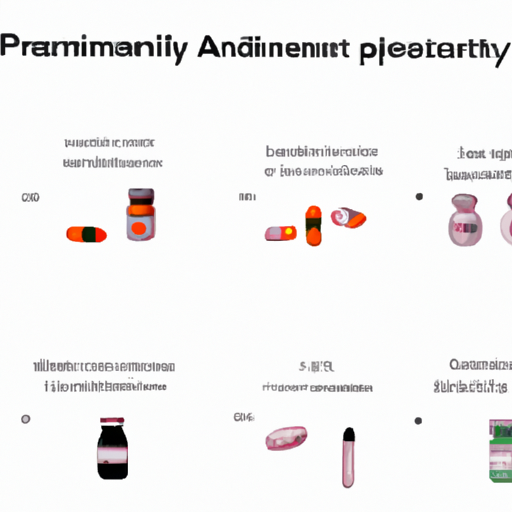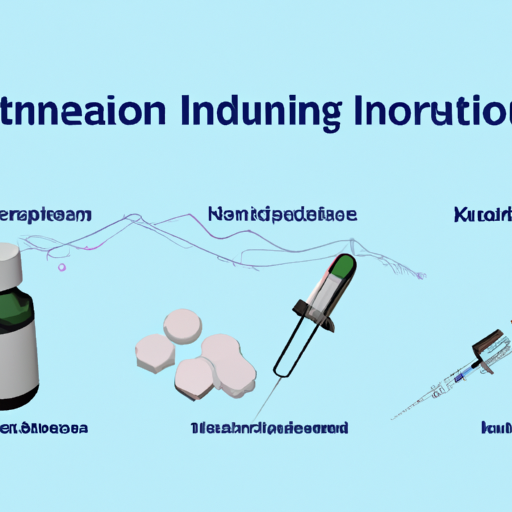This blog post provides an in-depth view of the future of pharmaceuticals, drawing insights from specialty pharmaceutical firms. It explores the emerging trends, technological advancements, and the role of innovation in shaping the future of this industry. The post further delves into the challenges and opportunities that lie ahead for these specialty firms in the dynamic pharmaceutical landscape.
1. 'The Evolution of Pharmaceutics: Where are we now?'
The field of pharmaceuticals has come a long way over the years, transforming the way we approach healthcare and the treatment of diseases. Today, we find ourselves at an exciting juncture where innovative technologies and scientific advancements are shaping the future of pharmaceuticals. With the rise of precision medicine and personalized therapies, the focus has shifted from a one-size-fits-all approach to a more tailored and targeted approach to treatment. This shift has been made possible by advances in genomics, data analytics, and biotechnology, allowing for a deeper understanding of disease mechanisms and the development of targeted therapies.
Moreover, the integration of artificial intelligence and machine learning has revolutionized drug discovery and development processes. These technologies enable pharmaceutical firms to sift through vast amounts of data and identify potential drug candidates with greater accuracy and efficiency. This has significantly accelerated the drug development timeline, bringing new treatments to patients faster than ever before.
In addition to technological advancements, there has been a growing emphasis on patient-centricity in the field of pharmaceuticals. The focus is no longer solely on the efficacy of a drug but also on factors such as patient satisfaction, adherence, and quality of life. Pharmaceutical firms are now investing in patient engagement strategies and incorporating patient feedback into their research and development processes.
Furthermore, the evolution of pharmaceuticals has also seen a shift towards a more holistic approach to healthcare. There is increasing recognition of the importance of preventive medicine and lifestyle interventions in managing and preventing diseases. Pharmaceutical firms are now exploring partnerships with digital health companies, wellness platforms, and healthcare providers to develop comprehensive solutions that go beyond traditional drug therapies.

1. An illustration of the timeline of pharmaceutical development
2. 'The Rising Role of Technology: Is Pharma Ready for the Digital Revolution?'
Technology has become an integral part of our daily lives, revolutionizing various industries, and the pharmaceutical sector is no exception. The rising role of technology in pharmaceuticals has the potential to transform the way drugs are developed, manufactured, and distributed. However, the question remains – is the pharma industry truly ready for the digital revolution?
One of the key areas where technology is making a significant impact is in data collection and analysis. With the advent of electronic health records, wearable devices, and health monitoring apps, vast amounts of real-time patient data are now available. This data can provide valuable insights into treatment outcomes, drug effectiveness, and patient behavior. However, the pharma industry must ensure that it has the necessary infrastructure and expertise to harness the power of big data and turn it into actionable insights.
Additionally, the digital revolution has given rise to the concept of telemedicine and remote patient monitoring. Virtual doctor visits, remote consultations, and digital health platforms have become increasingly popular, especially in the wake of the COVID-19 pandemic. Pharmaceutical firms need to adapt to this new model of healthcare delivery by exploring opportunities to integrate their products and services with digital health platforms and remote monitoring devices.
Furthermore, the digital revolution has opened up new avenues for patient engagement and education. Mobile apps, online communities, and social media platforms have become powerful tools for connecting with patients, providing them with information, and fostering a sense of community. Pharma companies need to embrace these digital channels to engage with patients, gather feedback, and enhance the overall patient experience.
Moreover, the automation of manufacturing processes through technologies such as robotics and artificial intelligence has the potential to improve efficiency, reduce costs, and ensure the quality and safety of pharmaceutical products. However, the industry must invest in the necessary infrastructure and expertise to adopt and implement these technologies effectively.
3. 'Challenges Facing Specialty Pharmaceutical Firms: How are they Coping?'
The landscape of the pharmaceutical industry is constantly evolving, and specialty pharmaceutical firms face unique challenges in this dynamic environment. Let's explore some of these challenges and how these firms are coping with them.
- 1. Pricing and Reimbursement Pressures:
Specialty pharmaceuticals often come with high price tags due to the complex manufacturing processes and targeted patient populations they serve. This puts these firms under scrutiny from payers and policymakers to justify the cost-effectiveness of their products. To cope with these pressures, specialty pharmaceutical firms are investing in health economic research and real-world evidence generation to demonstrate the value of their therapies. They are also exploring innovative pricing models such as outcome-based pricing and risk-sharing agreements to align reimbursement with patient outcomes. - 2. Market Access and Distribution Challenges:
Specialty pharmaceuticals require specialized distribution channels and expertise to reach patients. These firms often face hurdles in getting their products covered by insurance plans and gaining market access. To overcome these challenges, specialty pharmaceutical firms are actively engaging with payers, pharmacy benefit managers, and specialty pharmacies to build relationships and streamline the distribution process. They are also investing in patient support programs and adherence initiatives to ensure that patients have access to and can afford their medications. - 3. Regulatory and Compliance Complexity:
The regulatory landscape for specialty pharmaceuticals is intricate, with rigorous requirements for clinical trials, manufacturing processes, and safety monitoring. These firms must navigate through complex regulatory pathways and ensure compliance with constantly evolving regulations. To cope with these challenges, specialty pharmaceutical firms are investing in robust regulatory affairs teams and leveraging technology solutions to streamline regulatory processes. They are also actively engaging with regulatory agencies and participating in industry collaborations to shape policies that foster innovation while ensuring patient safety.

3. An infographic depicting the challenges faced by specialty pharmaceutical firms
עבור עוד פרטים נוספים בתחום של truemed וThe Future of Pharmaceutics: Insights from Specialty Pharmaceutical Firms עליך לבקר ב- truemedtx.com
4. 'The Opportunity Landscape: What Does the Future Hold?'
The future of specialty pharmaceutical firms is filled with immense opportunities. As advancements in technology and scientific research continue to accelerate, new avenues are opening up for these firms to explore. One such opportunity lies in the field of precision medicine, where therapies are tailored to an individual's genetic makeup, lifestyle, and environmental factors. This approach holds the promise of improving treatment outcomes and reducing adverse effects. Specialty pharmaceutical firms are investing in genomic research, biomarker identification, and personalized medicine platforms to capitalize on this opportunity.
Additionally, the growing focus on rare diseases presents a significant opportunity for specialty pharmaceutical firms. As more attention and resources are directed towards understanding and treating rare conditions, these firms can develop therapies to address unmet medical needs in this space. By leveraging their expertise in niche therapeutic areas, specialty pharmaceutical companies can make a significant impact on patients' lives and potentially gain a market advantage.
Another opportunity lies in the expansion of emerging markets. As healthcare infrastructure improves in developing countries, there is a rising demand for specialty pharmaceutical products. These firms can tap into these markets by adapting their business models, collaborating with local partners, and navigating regulatory complexities. By doing so, they can not only expand their reach but also contribute to improving access to advanced therapies in underserved regions.
Furthermore, the integration of digital health solutions presents an opportunity for specialty pharmaceutical firms to enhance patient engagement and medication adherence. By leveraging technologies such as mobile applications, wearables, and remote monitoring devices, these companies can gather real-time patient data, provide personalized support, and improve treatment outcomes.
5. 'Innovation in Drug Development: The New Frontier?'
With the rapid advancements in technology and the increasing understanding of complex diseases, innovation in drug development has become the new frontier for specialty pharmaceutical firms. These firms are pushing the boundaries of traditional drug discovery and development processes to create novel therapies that target specific disease mechanisms.
- 1. Targeted Therapies:
One area of innovation is the development of targeted therapies that can selectively act on specific cells or molecular pathways involved in disease progression. By identifying key biomarkers or genetic mutations associated with a particular disease, specialty pharmaceutical firms can design drugs that specifically target these abnormalities. This approach not only improves treatment efficacy but also minimizes potential side effects. - 2. Biologics and Gene Therapies:
Another area of focus is the development of biologics and gene therapies. Biologics are drugs derived from living organisms, such as proteins or antibodies, that can target specific disease targets with high precision. Gene therapies, on the other hand, aim to correct genetic defects or introduce therapeutic genes into the patient's cells. These innovative approaches hold great promise for treating previously untreatable diseases and have already shown remarkable success in areas such as oncology and rare genetic disorders. - 3. Drug Repurposing and Combination Therapies:
In addition to developing entirely new drugs, specialty pharmaceutical firms are exploring the potential of repurposing existing drugs for new indications. By identifying alternative uses for approved medications, these firms can bypass lengthy and costly development processes and bring effective treatments to patients more quickly. Furthermore, the combination of multiple drugs or therapies is being investigated as a strategy to enhance treatment outcomes and overcome drug resistance. This approach involves combining different mechanisms of action to target multiple disease pathways simultaneously.

5. An image depicting innovative drug development processes
6. 'Regulatory Hurdles: How Can Firms Navigate?'
Navigating regulatory hurdles is a significant challenge for specialty pharmaceutical firms in their pursuit of bringing innovative drugs to market. The regulatory landscape is complex and constantly evolving, requiring firms to stay updated on the latest guidelines and requirements.
First, conducting thorough preclinical and clinical trials is essential to demonstrate the safety and efficacy of a new drug. Specialty pharmaceutical firms must ensure that these trials adhere to rigorous standards set by regulatory authorities such as the FDA, EMA, or other regional agencies. This includes designing robust study protocols, collecting and analyzing data meticulously, and adhering to ethical guidelines.
Secondly, regulatory submissions need to be prepared with utmost care and attention to detail. Firms must compile comprehensive data packages that provide evidence of a drug's effectiveness and safety profile. This includes detailed information on the drug's formulation, manufacturing process, stability, and quality control measures. Engaging with regulatory consultants or experts can be beneficial in navigating the submission process and ensuring compliance with regulatory requirements.
Thirdly, ongoing post-marketing surveillance and pharmacovigilance activities are crucial to monitor the safety and effectiveness of drugs once they are on the market. Specialty pharmaceutical firms must establish robust systems for adverse event reporting, signal detection, and risk management. This involves close collaboration with regulatory authorities and timely reporting of any safety concerns or updates.
Furthermore, international regulatory harmonization efforts, such as the International Council for Harmonization of Technical Requirements for Pharmaceuticals for Human Use (ICH), aim to streamline global drug development and regulatory processes. Specialty pharmaceutical firms should actively engage in these initiatives to align their practices with international standards, facilitate global market access, and reduce redundancies in regulatory filings.
Lastly, maintaining open and transparent communication with regulatory authorities is crucial throughout the drug development and approval process. Firms should proactively engage in dialogue, seek regulatory guidance when needed, and address any concerns promptly. Building strong relationships with regulators can help smooth the regulatory pathway and expedite the approval process.
7. 'Collaboration and Partnerships: The Key to Success?'
In the ever-evolving landscape of specialty pharmaceuticals, collaboration and partnerships have emerged as key drivers of success. The complex nature of drug development, market access, and commercialization requires firms to form strategic alliances with various stakeholders.
Firstly, collaboration with academic institutions and research organizations enables specialty pharmaceutical firms to tap into cutting-edge research and scientific expertise. By partnering with renowned institutions, firms gain access to a pool of talented researchers, state-of-the-art facilities, and valuable intellectual property. This collaboration fosters innovation, accelerates drug discovery, and enhances the overall scientific credibility of the firm.
Secondly, collaboration with contract research organizations (CROs) and contract manufacturing organizations (CMOs) can streamline the drug development process. CROs provide specialized services such as clinical trial management, data analysis, and regulatory support, allowing firms to focus on core competencies. Similarly, partnering with CMOs can optimize manufacturing capabilities, ensuring efficient and compliant production of drugs.
Furthermore, collaboration with patient advocacy groups and patient organizations is essential for specialty pharmaceutical firms. These partnerships provide valuable insights into patients' needs, preferences, and experiences, helping firms develop patient-centric drug development and marketing strategies. By working closely with these organizations, companies can ensure that their products address unmet medical needs and have a positive impact on patients' lives.
Moreover, partnerships with payers, such as insurance companies and government healthcare agencies, are crucial for market access and reimbursement. Collaborating with payers during the drug development process can help firms understand the value proposition of their products and design clinical trials that generate evidence aligned with payer requirements. This collaboration increases the likelihood of favorable reimbursement decisions and broad market access.
Lastly, collaborations with other pharmaceutical companies, both large and small, can drive innovation and accelerate drug development. Joint ventures, licensing agreements, and co-development partnerships allow firms to share risks, resources, and expertise. By pooling their strengths, firms can overcome challenges more effectively and bring innovative therapies to market faster.

7. An image of two businesspeople shaking hands, representing collaborations and partnerships
The future of pharmaceuticals is set to be shaped by technological advancements and innovative practices, and specialty pharmaceutical firms will play a significant role in this transformation. While challenges such as regulatory hurdles and market competition persist, the opportunities for growth and evolution are immense. As we move forward, collaboration, innovation, and adaptation will be key drivers in the pharmaceutical industry's progress.

